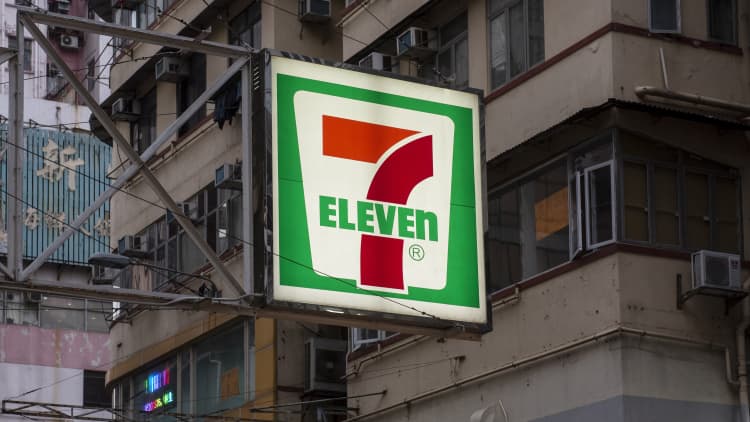Customers leave a 7-Eleven convenience store operated by Seven & i Holdings Co. on Friday, Aug. 30, 2024, in Kobe, Japan. Alimentation Couche-Tard Inc. has made a preliminary, non-binding proposal to acquire Seven&i. Operating more than 85,000 stores, the deal would be the largest foreign acquisition ever by a Japanese company. Photographer: Soichiro Koriyama/Bloomberg via Getty Images
Bloomberg | Bloomberg | Getty Images
Qiyi Holdings Rejects takeover bid from Canadian convenience store operator Nutritional Couche-TardIt said the offer was “not in the best interests of shareholders and interested parties”.
in a document Couche-Tard has offered to acquire all outstanding shares of Seven & i for $14.86 per share, the owner of 7-Eleven told the Tokyo Stock Exchange.
Stephen Dacus, chairman of the special committee Seven & i formed to evaluate the Couche-Tard proposal, said the proposal was “well-timed and seriously underestimates our path to independence and the other options we see that are feasible to achieve and unlock shareholder value in the near term.” way”. to the mid-term. “
In April, Seven & i announced a corporate restructuring plan aimed at expanding 7-Eleven’s global presence and divesting its underperforming supermarket business.

Dacus wrote that even if Kush-Tade “substantially increases” its offer, the proposal does not take into account the “multiple significant challenges” an acquisition by U.S. anti-competition authorities would face.
“You did not provide any perspective on the extent of the need for or the extent of divestitures, other than your simple assertion that you did not believe the merger would unfairly affect the competitive landscape and that you would ‘consider’ potential divestitures. How they would be accomplished,” he said in read a letter that appeared to be addressed to ACT Chairman Alain Bouchard and was published in a Tokyo Stock Exchange filing.
He also noted that the Kush-Tade proposal did not indicate any timetable for clearing regulatory hurdles or whether the company was “ready to act.” all Take necessary actions to obtain regulatory clearances, including filing litigation with the government.
Dacus said Seven & i is willing to consider proposals in good faith that are in the best interests of the company’s stakeholders and shareholders, but warned it would also resist proposals that “strive from shareholders the company’s intrinsic value or fail to concretely address very real regulatory issues.” “. worries. “
Shareholders speak out
In an interview with CNBC “Squawk Box Asia” Shortly before filing his response on Friday, Ben Herrick, associate portfolio manager at Artisan Partners, said Couche-Tard’s acquisition offer “highlights the fact that this management team and board have not done enough to add to the organization’s enterprise value.

Artisan Partners is a US fund that holds just over 1% of Seven & i. In August, the company had reportedly urged Qiyi Holdings It will “seriously consider” the takeover offer and seek bids for the company’s Japanese subsidiary “as soon as possible”.
Herrick explained that Artisan asked Seven&i to consider the proposal because the fund felt overseas capital allocation was being neglected.
He said Seven & i’s Japanese convenience store business doesn’t need to change much, but said there is a “huge opportunity” for international licensees operating outside the United States.
“You have over 50,000 stores, or about 50,000 stores that generate about $100 million or just over $100 million in operating profit for the company. So I think there’s a big mismatch there,” he said.
Herrick also believes Seven & i was slow to adopt changes due to inadequate oversight and accounting.
“We really need the company to implement its plans faster here. So (Seven and President Ryuichi) Isaka proposed his 100-day plan in 2016 to reform (grocery store) Ito-Yokado. We are approaching the first 3,000 days, so I think speed is not a big part of the culture and that needs to change,” he noted.
On Monday, Richard Kaye, portfolio manager at independent asset management group Comgest, told CNBC’s “Squawk Box Asia“I don’t think it’s necessary for foreign acquirers to make radical changes,” he said.
The company has done an excellent job with logistics and product innovation, “I think it’s hard to imagine it could be done better,” he added.

